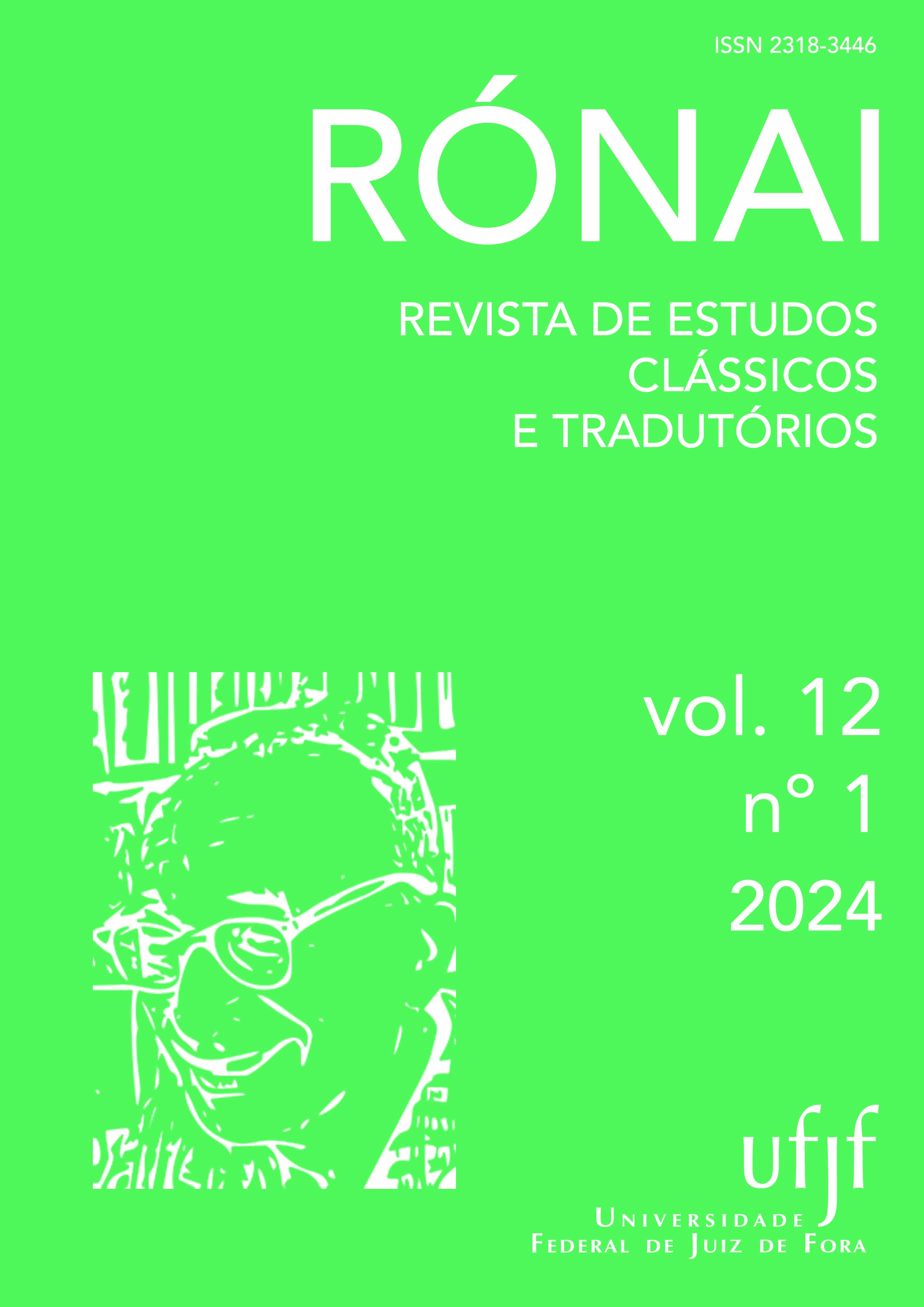Ludicra rhythmata
EXPERIMENTOS COM RIMA NA TRADUÇÃO DE POETAS LATINOS
DOI:
https://doi.org/10.34019/2318-3446.2024.v12.43827Palavras-chave:
Tradução Poética, Rima, Virgílio, Horácio, Fedro, MarcialResumo
O presente artigo visa apresentar traduções poéticas de excertos das obras dos poetas latinos Virgílio, Horácio, Fedro e Marcial. Nestas, a principal preocupação estética foi acomodar o original latino a um recurso de estilo ausente na versificação latina mas central na versificação em português: a rima. A despeito de tal ausência, a adoção da rima alcançou efeitos diversos em cada um dos textos traduzidos, quer na evidenciação de elementos rítmicos do original, quer na aproximação com elementos estéticos da língua de chegada. Na sequência de cada passagem, apresenta-se um breve comentário em que se explicitam motivações ou critérios usados em cada exercício.
Downloads
Referências
ARISTÓTELES. Retórica. tradução de Manuel Alexandre Jr, Paulo Farmhouse Alberto e Abel do Nascimento Pena. São Paulo: Folha de São Paulo, 2015.
BAUDELAIRE, Charles. As flores do mal. Tradução de Júlio Castañón Guimarães. São Paulo: Penguin/Companhia das Letras, 2019.
DEZOTTI, José Dejalma. O epigrama latino e sua expressão vernácula. Dissertação (Mestrado em Letras). Departamento de Letras Clássicas e Vernáculas, Universidade de São Paulo, São Paulo, 1991.
HASEGAWA, Alexandre. Dispositio e distinção de gêneros nos Epodos de Horácio: estudo acompanhado de tradução em verso. Tese (Doutorado em Letras). Departamento de Letras Clássicas e Vernáculas, Universidade de São Paulo, São Paulo 2010.
HORATIUS FLACCUS, Quintus. Opera. edidit D. R. Shackleton Bailey. Lipsiae: De Gruyter, 2001.
MARTIALIS, Marcus Valerius. Epigrammata. Recognouit breuique adnotatione critica instruxit W. M. Lindsay. Oxford: Clarendon Press, 1987.
PENNA, Heloísa. Implicações da métrica nas Odes de Horácio. Tese (Doutorado em Letras). Departamento de Letras Clássicas e Vernáculas, Universidade de São Paulo, São Paulo, 2007.
PHAEDRUS, Gaius Iulius. Fabulae Aesopiae. recensuit et adnotavi Giovanni Zago. Lipsiae: De Gruyter, 2020.
VERGILIUS MARO, Publius. Aeneis. recensuit atque apparatu critico instruxit Gian Biagio Conte. 2. ed. Lipsiae: De Gruyter, 2019.
VIRGÍLIO. A Eneida, traduzida em verso por João Franco Barreto. Nova Edição. Lisboa: Typografia Rollandiana, 1808.
Downloads
Publicado
Como Citar
Edição
Seção
Licença
Copyright (c) 2025 Fábio Paifer Cairolli

Este trabalho está licenciado sob uma licença Creative Commons Attribution 4.0 International License.
Direitos Autorais
Autores que publicam nesta revista concordam com os seguintes termos:
1. Autores e autoras mantém os direitos autorais e concedem à revista o direito de primeira publicação, sendo a publicação licenciada sob a Creative Commons Attribution License 4.0 Internacional.
2. Os autores e autoras têm permissão e são estimulados(as) a publicar e compartilhar o trabalho com reconhecimento da publicação inicial nesta revista.
3. Os autores e autoras dos trabalhos aprovados autorizam a revista a ceder o conteúdo de seus trabalhos, após sua publicação, para reprodução em indexadores de conteúdo, bibliotecas virtuais e similares.
Para mais informações sobre a Creative Commons Attribution 4.0 International License, acessar: https://creativecommons.org/licenses/by/4.0/
Isenção editorial
O conteúdo dos artigos publicados é de inteira e exclusiva responsabilidade de seus autores, não representando a posição oficial da Rónai - Revista de Estudos Clássicos e Literários ou do Faculdade de Letras da Universidade Federal de Juiz de Fora ou das instituições parceiras.



